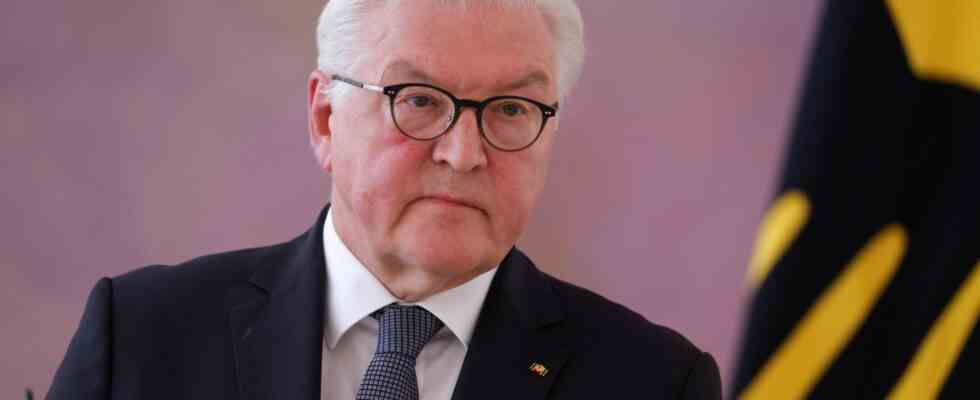Exclusive
Status: 06.11.2022 2:00 p.m
in the Report from Berlin Federal President Steinmeier promotes a social “compulsory time” for everyone and reaffirms support for Ukraine. He is aware that the latter in particular causes fears, but he sees it as an “orientation task”.
Not all conversations are pleasant when the Federal President moves his official residence. In Neustrelitz, Frank-Walter Steinmeier meets a woman who accuses him of having spoken about East Germany as “dark Germany”. The Federal President disagrees, but the conversation does not find a common denominator. In the end, the Federal President turned away. The common “we” as a basis for discussion simply seems to have been used up.
In another conversation with a fish seller at the Neustrelitz market, Steinmeier cuts a better figure. The woman reports her concerns: environmental protection goes too far, she can pursue her trade in fewer and fewer large bodies of water. Steinmeier is interested and asks. Afterwards she will say into a camera that if everyone had a profile like the Federal President, then you would be one step further, but unfortunately you don’t have that.
Such talks are the reason why the Federal President keeps moving his official residence away from Berlin. In an interview with Tina Hassel in Report from Berlin says Steinmeier that he wants to talk to people because it is clear to him that many of the capital city debates are not received in large parts of the country. The only condition is that the different positions are exchanged with respect for one another.
Steinmeier promotes the mandatory time model
One of these positions of the Federal President is the so-called social obligation time. Everyone, Steinmeier said in an interview, should do something for other people who are strangers to them once in their lives. It shouldn’t be limited to a specific age group. His approach to this should be understood as a contribution to the debate. “If there are better ideas than the compulsory time, I’m happy to discuss them,” he says. What should not happen is that the debate ends in nothing again.
Federal President Frank-Walter Steinmeier in conversation with Tina Hassel, ARD Berlin
Report from Berlin 6:00 p.m., 6.11.2022
Resolve conflicts with respect
In the interview, Steinmeier is shown a film at some point. It’s about a conflict in the small community of Steinalben in the Southwest Palatinate. A solar park is to be built there. This would have many advantages for the community but, among other things, disadvantages for species protection.
He has encountered such conflicts a few times during his travels in the country. But that is not solely representative of the state of our society. For example, the people in the country have taken in around a million refugees from Ukraine. After the disaster in the Ahr valley, there were thousands of people there who helped with the reconstruction in their free time. Yes, there are conflicts, but if they are fought out with respect for one another, as in stone albums, he is not afraid.
Departure from pro-Russian stance
The Federal President has often been criticized in recent months. His photos with the Russian Foreign Minister Sergey Lavrov in particular haunt him again and again. But Steinmeier has turned away from his earlier policy towards Russia.
A good two weeks ago he visited the Ukraine and experienced at first hand what it means to have to endure an air raid shelter. In a speech after the trip, he said: “If we look at today’s Russia, then there is simply no room for old dreams. Today our countries are against each other.”
Steinmeier must be a “communicative guide”.
In the eyes of many observers, he strikes the right note. But Steinmeier has to do that much more often, says communications expert Johannes Hilljedem ARD Capital Studio:
Communication is particularly important in a crisis. People are looking for orientation in many places, including hope. And it could and should be something like a communicative signpost. At a time when many are feeling insecure.
“Germany will not become a war party”
Around 57 percent of people in Germany fear that the Federal Republic will be drawn into the Ukraine war. This emerges from a survey by Infratest-Dimap for the ARD-DeutschlandTrend.
Steinmeier says that he sees this as an orientation task for the Federal President. You can’t say “this war is none of our business”. The war is being waged against everything that Germany stands for: “for freedom and democracy, for respect for the law and for drawn borders”. So the government is doing the right thing. Steinmeier emphasizes that Germany must support Ukraine to the best of its ability: “Financially, politically, economically and also militarily.” But Germany is not a party to the war and will not be.

